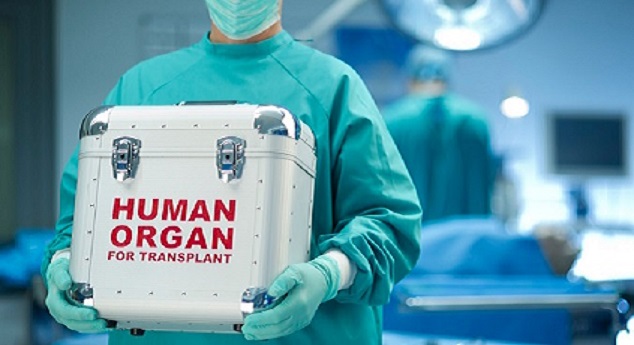News
Organised Crime Syndicates Harvest Human Organs in Nigeria, Others

Human organ harvesting is one of the most profitable black market operations around the world.
According to Business Insider, across the globe, it is coordinated by an organized crime syndicates who operates behind the scene.
For Africa, it is a similar operational module and most of the time many of the victims are either tricked into giving up their estimated over
Organized crime syndicates work behind the scenes. Their methods are varied across the markets in the region. Sometimes, they trick the victim into giving up the organ. While in some instances it is the cash payout that draws people to giving out their organs or they force the person.
Here are five major human organ black markets in Africa.
- Egypt
Egypt has one of the largest and most organized organ markets in Africa. This is as a result of high rate of medical tourists to the North African country, and more so the recent exodus of Eritreans attempting to make it to Europe through the country.
In this case, many of these migrants that could not pay for the cost of transmitting them across the sea are sold as slaves to organ harvesting syndicate in Egypt. These syndicates later kill them and harvest their organs. According to a telegraph to UK report in 2016, a person is sold for about $23,000.
About 500 unlicensed kidney transplants were reported each year and they were noted to be supplied from the local market. Where there’s poverty there are organ brokers. And what makes Egypt unique is that there is no law at present that punish organ harvesters.
- Libya
Libya is considered the biggest haven for organ traffickers in Africa. This is because the country is a major route for illegal migrant trying to connect Europe.

However, local residents are safe from this activity as Nationals of Nigeria, Ghana, Sudan, Somalia and other West African countries are their major targets.
- South Africa
South Africa is one of the leading destinations of many Europeans hoping to get an illegal organ transplant in Africa. The country is also famous for organ trafficking-related murder and has the largest organ trafficking ring that has been caught in Africa.
Between 2011 and 2012, more than 100 illegal kidney transplants were performed at St. Augustine Hospital in Durban, South Africa. Most of the recipients are from Isreal, Brazil and Eastern Europe countries.
The booming organ transplanting business in South Africa also rubbed-off on Mozambique which is the main supplier of organs to hospitals and medical syndicates engaging in this activity.
- Mozambique
Mozambique is believed to have one of the most active organ markets in Southern Africa. This is mainly due to huge organ translating market in South Africa.
In the country, the most common organ for sale is the human kidney, which is sometimes used for witchcraft purpose in the country.
An incidence in Southern Mozambique in January 2017 confirmed existence of this trade in the country and the destination was stated as South Africa.
- Nigeria and Lake Chad region
In the wake of the Boko Haram crisis in the Northeast Nigeria and along the Lake Chad basin, organ trafficking is also stated to be a booming trade in the region.
The high number of dead bodies found without some organs have raised the possibility of the trade moving to the Western part of the region from its main strongholds in the north of Africa.
News
Firms Seek Specialized Expertise to Combat AI Cyber Threats – Study Reveals

As concerns about the use of AI in cyberattacks increase, companies worldwide are racing to bolster their cybersecurity strategies, according to a Kaspersky survey.

In a new study the cybersecurity company revealed that 92% of IT and Information Security professionals surveyed in the Middle East, Turkiye and Africa (META) region expect the use of AI by malicious actors to escalate over the next two years.
This growing threat is prompting organisations to prioritise cyber defense expertise, with many turning to cybersecurity vendors for specialised support and training.
In its latest study titled “Cyber defense & AI: Are you ready to protect your organisation?” Kaspersky gathered insights from IT and Information Security professionals across SMEs and large enterprises. The findings underscore the urgent need to prepare for AI-driven cyberattacks.
To combat these evolving threats, companies place high value on cybersecurity expertise, with 94% of respondents in the META region highlighting the importance of growing internal expertise through training for in-house employees, and 93% underscoring the need for external expertise provided by cybersecurity vendors. This need spans sectors from retail to critical infrastructure, emphasising a universal demand for advanced threat protection.
To reinforce their cyber protection, organisations are actively integrating both internal and external expertise. Currently, 36% of companies surveyed in the META region are either implementing or planning to deploy external support to adapt to the evolving threat landscape, while 34% are doing the same through internal training initiatives. Additionally, 61% already use external cybersecurity expertise, and 62% have training programs in place, underscoring a dual approach in fortifying their protection.
Cybersecurity vendors’ expertise can come in various forms, from specialised professional services that help organisations deploy their protection solutions, to advanced expert centers that focus on specific security challenges.
One of these centers is the Kaspersky AI Technology Research Center. It brings together the company’s AI research and development efforts, to deepen the protective capabilities of cybersecurity solutions.
Vladislav Tushkanov, Group Manager at the Kaspersky AI Technology Research Center, says: “Our latest survey shows that businesses are acutely aware of the rising threat from AI-driven cyberattacks and are looking to reinforce their protection through comprehensive solutions, including the use of vendors’ extensive cybersecurity expertise.
The Kaspersky AI Technology Research Center plays a pivotal role by helping us leverage AI advancements to enhance our threat protection strategies and explore innovative ways of using AI in cybersecurity. It also enables us to address security concerns specific to AI itself, ensuring that businesses are prepared for the latest AI-driven threats.”
News
EFCC Dismantles Fake Hotel Review Syndicate, Arrests 105 in Crackdown

Economic and Financial Crimes Commission (EFCC) has dismantled a fake hotel review syndicate and arrested four Chinese nationals and 101 Nigerians for their roles in the elaborate internet fraud scheme.

Victims were allegedly first lured into rating hotels in exchange for small sums of money.
Eventually they would be encouraged to make bookings in any of the rated hotels for as much as $500.
They were told that the company would pay them back with chunky interest into a crypto wallet bearing their names.
However, the victims would in the end not be able to open the wallet.
EFCC announced that the suspects operated out of Naka Hall Plaza on Abutu Garba Street in Gudu, Abuja, where agents recovered 100 compact workstations.
Dele Oyewale, spokesman, EFCC, said the suspects used fake foreign identities to target unsuspecting victims, primarily U.K. residents.
Authorities said the criminal network was allegedly led by the Chinese nationals, who recruited and trained Nigerian youths with advanced technical skills to act as customer service representatives.
These representatives followed a predesigned script to deceive their victims online.
The operation follows a separate crackdown weeks earlier, in which 792 suspects — including 148 Chinese nationals — were arrested for involvement in cryptocurrency and romance scams.
The foreign nationals allegedly used corporate apartments disguised as business centers to train their Nigerian accomplices. These accomplices were reportedly taught to initiate romance and investment scams and use their own identities to carry out fraudulent activities.
The EFCC also highlighted a concerning trend of foreign nationals instructing Nigerians in internet-related crimes.
News
AfDB to Partner LAMATA to Expand Existing Rail System

The African Development Bank (AfDB), has disclosed plans to work with the Lagos Metropolitan Area Transport Authority (LAMATA), to boost the state’s transport system with the development of another rail line.

This was contained in a statement signed by, the Head, Corporate Communication, LAMATA, Mr. Kolawole Ojelabi in Lagos.
Ojelabi said that the AfDB Vice President, Private Sector Infrastructure and Industrialisation, Mr. Solomon Quaynor, gave the assurance during a visit to LAMATA.
He added that the bank was interested in partnering LAMATA to expand the capacity of the existing rail system.
“Quaynor was also in the company of the Non-Sovereign Operations and Private Sector Equity Specialist, Mr Mayowa Ayodele ahead of a visit of the technical team to assess the Purple line,” he said.
The Purple Line is a 60-kilometre railroad along the Redemption Camp in Ogun State, traversing Berger, Agege and Alimosho and terminate at Volkswagen to join the Blue Line.
“The visit follows a recent pitch for investment on 60-kilometre Lagos Rail Mass Transit (LRMT) Purple Line at the African Development Bank forum in Morocco, where the Lagos delegation was led by Governor Babajide Sanwo-Olu.
“This is to further discuss collaboration on the project and other lines outlined in the Lagos Strategic Transport Master Plan. The delegation toured the LRMT Blue Line and expressed satisfaction with the progress of the Blue Line rail system,” he said.

 General News3 days ago
General News3 days agoLagos State Sets Strict Deadline for 2024 Tax Returns Filing

 Telecom3 days ago
Telecom3 days agoSuspected Lakurawa Terrorists Kill 3 Telcoms Workers in Kebbi

 E-Financial3 days ago
E-Financial3 days agoBudgIT Queries Irregularities in FG’s Proposed 2025 Budget

 News3 days ago
News3 days agoSERAP Drags FG, Govs to ECOWAS Court over ‘Misuse of Cybercrimes Act’

 E-Financial3 days ago
E-Financial3 days agoNAICOM Seeks Police’s Support to Enforce Third-party Motor Insurance

 E-Business3 days ago
E-Business3 days agoLagos, NIPOST Partner to Transform e-Commerce Delivery

 E-Financial3 days ago
E-Financial3 days agoGAIM 6: Fidelity Bank Rewards 10 Customers with N10m

 Telecom2 days ago
Telecom2 days agoUSSD Dispute: FG May Blacklist 18 Banks Allegedly Owing Telcos N250Bn























